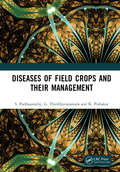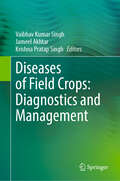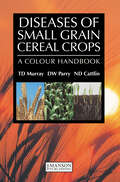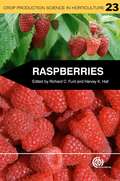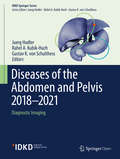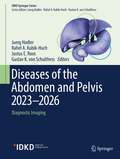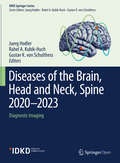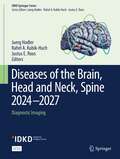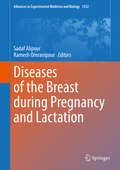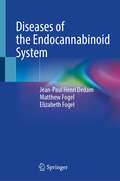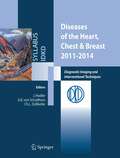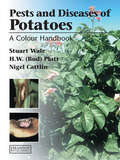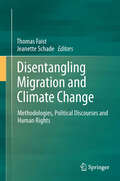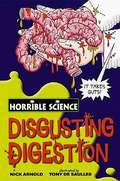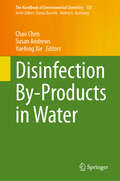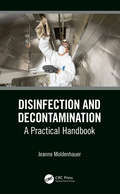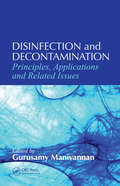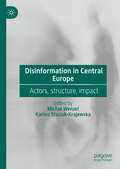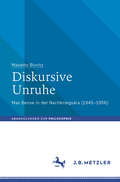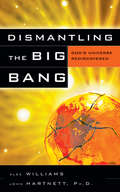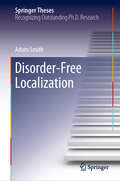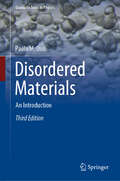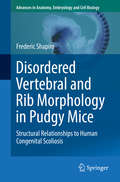- Table View
- List View
Diseases of Field Crops and their Management
by S. Parthasarathy G. Thiribhuvanamala K. PrabakarThe book entitled Diseases of Field Crops and their Management provides most recent information about major diseases of cultivation field crops, their symptoms, pathogen characters, epidemiology, and management. In order to make the book all in one, the importance of major diseases has also been dealt with in brief. Note: T&F does not sell or distribute the Hardback in India, Pakistan, Nepal, Bhutan, Bangladesh and Sri Lanka.
Diseases of Field Crops: Diagnostics and Management
by Krishna Pratap Singh Vaibhav Kumar Singh Jameel AkhtarThis edited book is a compilation of the chapters on the recent advances made in the field of disease management in various field crops. It covers host resistance, regulatory mechanism as well as non-chemical methods and computer-based applications in disease management. Molecular marker assisted selection, proteomic approaches, CRISPR-Cas mediated technology to improve food quality and minimize negative public health impact associated with crop diseases is also discussed. Plant diseases continue to be major challenge to global crop production, especially field crops, inflicting not only crop yield losses to farmers, but also decline quality as well as nutritional value leading threat to global food security. According to FAO statistics, there is a need of 70% steady increase in agricultural production to fulfil the food requirements of 9.1 billion populations by 2050, and annual global crop losses due to pests and diseases have been estimated to be about 30%. Therefore, the book aims at bringing out a comprehensive information on field crop diseases, plant disease detection and diagnosis, monitoring, forecasting/forewarning, and management. The book is very useful for students, teachers, researchers, planners/administrators, and also the end users at national and international level.
Diseases of Small Grain Cereal Crops: A Colour Handbook
by Nigel D. Cattlin T.D. Murray David W. ParryThe small grain cereals wheat, barley, oats and rye are cultivated worldwide. They form the foundation of most agricultural systems and are essential in the manufacture of staple products such as bread, pasta and fermented beverages. Reflecting the global and economic importance of cereal crops, this book aims to make identification of diseases aff
Diseases of Temperate Horticultural Plants
by Tim O'Neill Raymond A George Robert Saville Roland Fox Susan Mccallum Mohammad Babadoost João Pedro LuzContaining an extensive range of photographs and authored by leading horticultural experts, 'Diseases of Temperate Horticultural Plants' is an indispensable reference work for horticultural professionals, academics, students, crop producers as well as amateur horticulturists. The diseases of major crops are presented according to their classification, and the symptoms of each disease, causal pathogen and control measures for each condition are described. The crops covered include the major temperate horticultural crops, organised into easy to navigate sections divided into fruits, vegetables and ornamentals. Within fruits, apples and pears are discussed, as well as ribes and berries, cherries, peaches and plums, nut crops and rhubarb. The vegetable section covers salad crops, brassicas and crucifers, cucurbits, root vegetables, bulb crops, solanaceous vegetables and some herbs. The section on ornamental plants includes a wide range of ornamental garden plants, while a further section discusses diseases of turf grass and ornamental lawns. The book is user-friendly with practical, accessibly written entries organised into discrete sections. The comprehensive nature of this work makes it an invaluable addition to any horticulturist's library with content that will remain current for years to come.
Diseases of the Abdomen and Pelvis 2018-2021: Diagnostic Imaging - Idkd Book (IDKD Springer Series)
by Gustav K. Schulthess Rahel A. Kubik-Huch Juerg HodlerThis open access book deals with imaging of the abdomen and pelvis, an area that has seen considerable advances over the past several years, driven by clinical as well as technological developments. The respective chapters, written by internationally respected experts in their fields, focus on imaging diagnosis and interventional therapies in abdominal and pelvic disease; they cover all relevant imaging modalities, including magnetic resonance imaging, computed tomography, and positron emission tomography. As such, the book offers a comprehensive review of the state of the art in imaging of the abdomen and pelvis. It will be of interest to general radiologists, radiology residents, interventional radiologists, and clinicians from other specialties who want to update their knowledge in this area.
Diseases of the Abdomen and Pelvis 2023-2026: Diagnostic Imaging (IDKD Springer Series)
by Rahel A. Kubik-Huch Gustav K. von Schulthess Juerg Hodler Justus E. RoosThis open access book deals with imaging of the abdomen and pelvis, an area that has seen considerable advances over the past several years, driven by clinical as well as technological developments. The respective chapters, written by internationally respected experts in their fields, focus on imaging diagnosis and interventional therapies in abdominal and pelvic disease; they cover all relevant imaging modalities, including magnetic resonance imaging, computed tomography, ultrasound, and positron emission tomography. As such, the book offers a comprehensive review of the state of the art in imaging of the abdomen and pelvis. IDKD books are extensively re-written every four years. As a result, they offer a comprehensive review of the state of the art in imaging. The book is clearly structured with learning objectives, abstracts, subheadings, tables and take-home points, supported by design elements to help readers easily navigate through the text. As an IDKD book, it is particularly valuable for general radiologists, radiology residents, and interventional radiologists who want to update their diagnostic knowledge, and for clinicians interested in imaging as it relates to their speciality.
Diseases of the Brain, Head and Neck, Spine 2020–2023: Diagnostic Imaging (IDKD Springer Series)
by Rahel A. Kubik-Huch Gustav K. von Schulthess Juerg HodlerThis open access book offers an essential overview of brain, head and neck, and spine imaging. Over the last few years, there have been considerable advances in this area, driven by both clinical and technological developments. Written by leading international experts and teachers, the chapters are disease-oriented and cover all relevant imaging modalities, with a focus on magnetic resonance imaging and computed tomography. The book also includes a synopsis of pediatric imaging. IDKD books are rewritten (not merely updated) every four years, which means they offer a comprehensive review of the state-of-the-art in imaging. The book is clearly structured and features learning objectives, abstracts, subheadings, tables and take-home points, supported by design elements to help readers navigate the text. It will particularly appeal to general radiologists, radiology residents, and interventional radiologists who want to update their diagnostic expertise, as well as clinicians from other specialties who are interested in imaging for their patient care.
Diseases of the Brain, Head and Neck, Spine 2024-2027: Diagnostic Imaging (IDKD Springer Series)
by Rahel A. Kubik-Huch Juerg Hodler Justus E. RoosThis open access book offers an essential overview of brain, head and neck, and spine imaging. Over the last few years, there have been considerable advances in this area, driven by both clinical and technological developments. Written by leading international experts and teachers, the chapters are disease-oriented and cover all relevant imaging modalities, with a focus on magnetic resonance imaging and computed tomography.IDKD books are rewritten (not merely updated) every four years, which means they offer a comprehensive review of the state-of-the-art in imaging. The book is clearly structured and features learning objectives, abstracts, subheadings, tables and take-home points, supported by design elements to help readers navigate the text. It will particularly appeal to general radiologists, radiology residents, and interventional radiologists who want to update their diagnostic expertise, as well as clinicians from other specialties who are interested in imaging for their patient care.
Diseases of the Breast during Pregnancy and Lactation (Advances in Experimental Medicine and Biology #1252)
by Sadaf Alipour Ramesh OmranipourSymptoms of the breast in gravid women commonly represent physiological changes, however they may also be related to serious underlying breast disease; this challenging dilemma is aggravated by diagnostic and therapeutic limitations imposed by safety issues regarding the mother and fetus. A comprehensive coverage of all aspects of normal and pathologic breast changes during pregnancy and lactation, their diagnosis and management is provided in the present work. The organized structure of this book begins with gestational changes of the breast, while discussing safety, hazards, and arguments regarding diagnostic approaches. It then goes on by describing various clinical presentations and common and uncommon benign disorders during gravidity. The book then addresses pre-malignant lesions of the breast, opening the dialogue on how to manage these confusing lesions in pregnant and nursing women. It continues toward pregnancy-associated breast cancer, focusing on every facet of the problem, including epidemiology, diagnosis, treatment and complications, anesthetic considerations, prenatal care, and rare malignancies; and comes to an end by arguing main psychological concerns. In the midst of this orderly sequence fertility issues, pregnancy, and breastfeeding in women who have overcome their breast cancer are also discussed. This unique reference has been written by academic experts from different centers and diverse disciplines in a practical format. It is intended to be an ideal resource for every practitioner and specialist who manages complaints of gravid and nursing women or treats breast disorders in women of child bearing age.
Diseases of the Endocannabinoid System
by Matthew Fogel Elizabeth Fogel Jean-Paul Henri DedamThis book fills the need for a detailed examination of the role of Endocannabinoid System in all the body's main organ systems and how dysregulation of that system can lead to disease. It serves as an in-depth analysis of the thousands and thousands of studies on the Endocannabinoid System within the medical literature. It covers the many diseases that can result from Endocannabinoid system dysfunction, ranging from metabolic syndrome to anxiety disorders to osteoporosis. The book is written primarily for medical providers and those with a science background.
Diseases of the Heart, Chest & Breast 2011-2014
by Christoph L. Zollikofer Gustav K. Schulthess Jürg HodlerWritten by internationally renowned experts, this volume deals with imaging of diseases of heart, chest and breast. The different topics are disease-oriented and cover all the relevant imaging modalities, including standard radiography, CT, nuclear medicine with PET, ultrasound and magnetic resonance imaging, as well as imaging-guided interventions. This book presents a comprehensive review of current knowledge in imaging of the heart and chest , as well as thoracic interventions and a selection of "hot topics" of breast imaging. It will be particularly relevant for residents in radiology, but also very useful for experienced radiologists and clinicians specializing in thoracic disease and wishing to update their knowledge of this rapidly developing field.
Diseases, Pests and Disorders of Potatoes: A Colour Handbook
by Stuart Wale Bud Platt Nigel D. CattlinCovering the most important pathogens, this handbook provides clear, concise descriptions of the symptoms and cycles of diseases and disorders, and the pests that commonly prey on potato crops, their distribution and importance, and advice on their control. The text is illustrated with some 235 superb color photographs of affected crops to aid in the rapid and accurate identification of disease. It provides a practical reference for professionals and students involved with potato production, handling and storage worldwide.Diseases and Pests covered include: Potato early blight, Gray mould, Black dot, Ring rot, Blackleg, Soft rot, Pit rot, Dry rot and wilt, Violet root rot, Silver scurf, Aster yellows, Witches broom, Pocket rot, Gangrene, Pink rot, Potato late blight, Skin spot, Spraing, Mild Mosaic, Sev. Mosaic, Net Necrosis, Watery wound rot, Leak, Brown rot, Stem canker, Black Scurf, White mould, Powdery scab, Common scab, Wart, Spraing, Verticillium wilt.
Disentangling Migration and Climate Change: Methodologies, Political Discourses and Human Rights
by Thomas Faist Jeanette SchadeThis book addresses environmental and climate change induced migration from the vantage point of migration studies, offering a broad spectrum of approaches for considering the environment/climate/migration nexus. Research on the subject is still frequently narrowed down to climate change vulnerability and the environmental push factor. The book establishes the interconnections between societal and environmental vulnerability, and migration and capability, allowing appreciation of migration in the frame of climate as a case of spatial and social mobility, that is, as a strategy of persons and groups to deal with a grossly unequal distribution of life chances across the world. In their introduction, the editors fan out the current debate and state the need to transcend predominantly policy-oriented approaches to migration. The first section of the volume focuses on "Methodologies and Methods" and presents very distinct approaches to think climate induced migration. Subsequent chapters explore the sensitivity of existing migration flows to climate change in Ghana and Bangladesh, the complex relationship between migration, demographic change and coping capacities in Canada, methodological challenges of a household survey on the significance of migration and remittances for adaptation in the Hindu Kush region and an econometric study of the aftermath of the 1998 floods in Bangladesh. The second part, "Areas of Concern: Politics and Human Rights", deepens the analysis of discourses as well as of the implications of proposed and implemented policies. Contributors discuss such topics as environmental migration as a multi-causal problem, climate migration as a consequence in an alarmist discourse and climate migration as a solution. A study of an integrated relocation program in Papua New Guinea is followed by chapters on the promise and the flaws of planned relocation policy, global policy on protection of environmental migrants including both internally displaced peoples and those who cross international borders. A concluding chapter places human agency at centre stage and explores the interplay between human rights, capability and migration.
Disgusting Digestion
by Nick Arnold Tony De SaullesScience with the squishy bits left in! What disease makes your eyes bleed? Why can't astronauts eat beans before a space flight? Which part of your brain makes you throw up? Get the awful answers in Disgusting Digestion
Disinfection By-Products in Water (The Handbook of Environmental Chemistry #135)
by Chao Chen Yuefeng Xie Susan AndrewsThis book offers a comprehensive review of disinfection by-products (DBPs), exploring various aspects from detection methods and precursors to their potential health risks, regulation, and future implications. This book is also a memorial to the 50th anniversary of the first major DBP report in 1974 by Dr. Rook, who identified chloroform in chlorinated drinking water, initiating the study of DBPs. For half a century, chemists, toxicologists, engineers and regulators have been identifying more DBPs, understanding their formation mechanism, evaluating their health effects on the public, and minimizing and controlling their formation in drinking water. Divided into four parts, the book commences with an introduction to the general knowledge of DBPs, shedding light on the significance of DBPs and their impact on water quality. It also delves into the detection methods employed to identify and quantify DBPs, offering readers invaluable insights into cutting-edge techniques and emerging technologies, and explores the sources and characteristics of DBP precursors. In Part II, several expert contributors provide an overview of individual DBPs, including halogenated aliphatic, iodinated, aromatic, and heterocyclic DBPs, discussing their properties and potential implications. The discussion extends to nitrogenous DBPs, the group of nitrosamines, and inorganic DBPs as well. Part III provides an authoritative perspective on the relationship between energy consumption, climate change, and DBP formation, offering also insights into DBPs in the context of water treatment plants, water reuse plants, swimming pools, and everyday life. The book closes with a section devoted to the health effects of DBPs, where particular attention is given to the analysis of the toxicity and health risks associated with DBPs. In this section, readers will find more about the potential adverse effects of DBPs on human health and current research on risk assessment and management strategies. In today's era of water scarcity and increasing demands for safe drinking water, the presence of DBPs has emerged as a critical concern in the field of public health. This book is, therefore, an invaluable resource for researchers, water treatment professionals, public health officials, and policymakers seeking a comprehensive understanding of DBPs.
Disinfection and Decontamination: A Practical Handbook
by Jeanne MoldenhauerThis book describes various methods of decontamination and how the methods work. There is a discussion of the various cleaning and disinfection methods utilized, along with details of how to qualify these methods. It also describes new technologies that may be useful in the battle for decontamination across industries. Finally, this book provides a single resource on how one can address contamination issues for a variety of manufacturing processes and industries. Explores new technologies that may be useful in the battle for decontamination Examines various methods of decontamination and how the methods work Addresses contamination issues for a variety of manufacturing processes and industries Describes how to detect contaminants as well as how to deal with contaminants that are present Includes methods for both decontamination (reaction) and preventing contamination (proactive)
Disinfection and Decontamination: Principles, Applications and Related Issues
by Gurusamy ManivannanIn the battle between humans and microbes, knowledge may be not only the best weapon but also the best defense. Pulling contributions from 34 experts into a unified presentation, Disinfection and Decontamination: Principles, Applications, and Related Issues provides coverage that is both sophisticated and practical. The book reviews the fund
Disinformation in Central Europe: Actors, structure, impact
by Michał Wenzel Karina Stasiuk-KrajewskaThis book presents different approaches to disinformation based on original data from quantitative and qualitative studies conducted within CEDMO (Central European Digital Media Observatory). The linguistic and visual features of this type of communication are analyzed in the context of the discursive and genre framing of fake news. The authors discuss the psychological mechanisms of the reception of manipulated content, as well as the legal and political contexts of disinformation in Central Europe (Poland, the Czech Republic, Slovakia). The book presents the results of comparative research on attitudes to Covid-19 and the war in Ukraine, linking the two. The volume contains not only empirical studies, but also an elaborate proposal for a theoretical approach to manipulated content and a coherent methodological model that can be used to deepen scientific knowledge of this complex area of study.
Diskursive Unruhe: Max Bense in der Nachkriegsära (1945–1956) (Abhandlungen zur Philosophie)
by Masetto BonitzMax Bense (1910–1990) suchte in der Nachkriegsära entschieden die Öffentlichkeit. Er war Diskursträger und eine Persönlichkeit, die polarisierte. Dennoch geriet er in eine offensichtlich merkwürdige Vergessenheit, die seinem Werk, seiner Persönlichkeit und der geschichtlichen Entwicklung nicht gerecht wird. Dieses Buch befasst sich eingehend mit dem im Deutschen Literaturarchiv Marbach liegenden Nachlass Max Benses und fokussiert insbesondere auf den Briefeschreiber und -empfänger in der Nachkriegsära (1945–1956). Dabei wird sichtbar, was in dieser Zeit kulturpolitisch als auch geistesgeschichtlich verhandelt wurde und was für deutsche Gelehrte, Intellektuelle und Schriftsteller auf dem Spiel stand. Bense agierte in Diskursen der Philosophie, Literatur, Kunst und Politik, wobei er gegen erhärtete Machtstrukturen vorging und seine Umwelt beunruhigte. Er verfasste eine Vielzahl kritischer Beiträge für Zeitungen, Zeitschriften und Sammelbände, die symptomatisch für die Nachkriegszeit waren. Sie transportieren dabei oftmals politische Dimensionen, durch die Stimmungen der frühen Nachkriegsjahre und der Adenauerzeit sichtbar werden.
Dismantling the Big Bang: God's Universe Rediscovered
by Alexander Williams Dr John HartnettWhy did Ptolemy's theory cause problems for the church? What is the big secret concerning the "?Age" of the earth? Why do many scientists reject the use of design in explaining origins? The seemingly absurd idea that all matter, energy, space, and time once exploded from a point of extreme density has captured the imagination of scientists and laypersons for decades. The big bang has provided a central teaching for the eons of time of "cosmic evolution", undermining the history and cosmology of the Bible. It is a theory that fails, even violating the very physical laws on which it is purportedly based.In this easy-to-read format, authors Alex Williams and John Hartnett explode this naturalistic explanation for the universe, and show that the biblical model provides a far better explanation of our origins. This fully indexed, illustrated analysis of the big bang theory is an invaluable help in understanding and countering a world view that is as chaotic and destructive as its name implies.
Disney's Pixar®: How Steve Jobs Changed Hollywood
by Aurelia JacksonPixar is one of the most successful companies creating movies today. You've probably seen at least one of their huge hits, movies such as Toy Story, Monsters, Inc., Cars, or Wall*E. Ever since Steve Jobs, founder of Apple Computers, bought the company from George Lucas, creator of Star Wars, Pixar has changed the way animated movies are made. Steve has turned the company into something incredible. Discover the story of how Steve gave Pixar the chance to make their first movies, how Pixar changed Hollywood--and how Pixar hopes to keep on amazing moviegoers in the future.
Disorder-Free Localization (Springer Theses)
by Adam SmithThis thesis is a contribution at the intersection of a number of active fields in theoretical and experimental condensed matter, particularly those concerned with disordered systems, integrable models, lattice gauge theories, and non-equilibrium quantum dynamics. It contributes an important new facet to our understanding of relaxation in isolated quantum systems by conclusively demonstrating localization without disorder for the first time, answering a long-standing question in this field. This is achieved by introducing a family of models – intimately related to paradigmatic condensed matter models – and studying their non-equilibrium dynamics through a combination of exact analytical mappings and an array of numerical techniques. This thesis also makes contributions relevant to the theory of quantum chaotic behaviour by calculating novel, and often intractable, entanglement measures and out-of-time-ordered correlators. A concrete and feasible proposal is also made for the experimental realization and dynamical study of the family of models, based on currently available technologies.
Disordered Materials: An Introduction (Graduate Texts in Physics)
by Paolo M. OssiThis self-contained textbook takes readers on a comprehensive journey through the intricate realm of physics in structurally disordered condensed materials. Tailored for advanced undergraduate and graduate students, this book unfolds the complexities step by step. In this updated and enlarged 3rd edition, fundamental building blocks serve as the foundation for constructing structural models of disordered solids, delving into their geometry and symmetry. The scope of the book encompasses the phenomenology and various models of the glass transition, elucidating the characteristics of bulk metallic glasses. Structural analysis techniques for amorphous solids, the role of atomic clusters in structure evolution, quasicrystals, nanometer-sized disordered solids, cluster-assembled materials, and the synthesis and assembly of nanoparticles are explored. The text also navigates through the intricacies of transport and localization in heavily disordered materials, offering insights into controlled growth of thin films. Throughout, the narrative is enriched with references to recent and pertinent results, both experimental and theoretical, providing readers with a gateway to the latest and most dynamic research areas in the field.
Disordered Pharmaceutical Materials
by Marc DescampsA one-stop resource for researchers and developers, this handbook and ready reference provides detailed, but not overloaded information -- presenting the topic without unnecessarily complex formalism. As such, it gives a systematic and coherent overview of disordered materials for pharmaceutical applications, covering fundamental aspects, preparation and characterization techniques as well as molecular modeling approaches for the target-oriented development of drug delivery systems based on amorphous solids. Chapters on the challenges of using these materials in large-scale processes in the pharmaceutical industry and on patenting issues round off the book. For pharmaceutical and medicinal chemists, materials scientists, clinical physicists, and pharmaceutical laboratories looking to make better and more potent pharmaceuticals.
Disordered Vertebral and Rib Morphology in Pudgy Mice
by Frederic ShapiroThis book presents results obtained from the whole mount preparations, radiological, and histological studies of 60 pu/pu and pu/+ mice from late embryo until 3 months of age. Most mice were in the embryo to 6 week age group where vertebral developmental changes are most marked. Although vertebral abnormalities have been identified as due to mutations in the delta-like 3 (Dll3) gene, it is evident that each mouse has differing structural abnormalities. The disorder is analogous to human congenital scoliosis, a common variant of which is spondylocostal dysplasia. The histological studies presented in this book include plastic embedded sections which allow for high level resolution not only of vertebrae, intervertebral discs, and ribs but also of associated spinal cord, nerve roots and ganglia. In addition an overview of embryo and neonatal development in mouse, chick and human vertebrae is provided to better assess how and where deviant pathoanatomy occurs. The book discusses the possible variables involved in creating final deformity beyond the gene abnormality itself.
